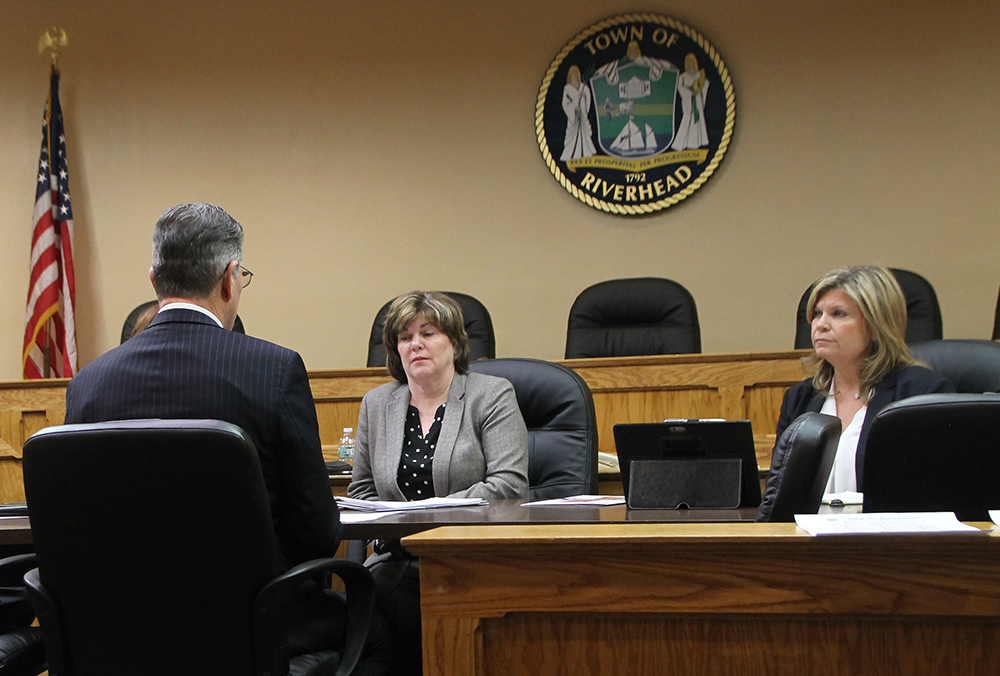Giglio says Riverhead Town should sue Suffolk IDA

Councilwoman Jodi Giglio said she believes Riverhead Town should sue the Suffolk County Industrial Development Agency after it approved a culinary school’s latest request for a tax abatement.
The Suffolk IDA last week approved a compromise between Riverhead Town officials, the Riverhead School District and Suffolk County Community College on a tax abatement for the college’s culinary school building in downtown Riverhead.
Ms. Giglio said at Thursday’s work session that she hopes the decision can be reversed.
Last November, the town and school district urged the Suffolk IDA not to grant an enhanced tax exemption to the building owner and developer, Ron Parr, and the college’s culinary school. The town and district claimed that the college failed to pay money owed through a PILOT, or payment in lieu of taxes, from the previous 10-year tax abatement it was granted.
The town and school later received a payment of $258,113 total.
Ms. Giglio, who has expressed frustration with Riverhead’s IDA in the past, discussed with the Town Board and town attorney Bob Kozakiewicz the option of suing the Suffolk IDA.
There’s no criteria for the IDA to grant the property tax incentives, she said. The councilwoman made a similar argument at the Nov. 14 public hearing on the issue.
“They haven’t created new jobs, they haven’t created any economic impact before the IDA gave them another tax break,” she said.
Councilman Jim Wooten said the culinary arts program is popular and the IDA may have intended to bring foot traffic to Main Street. Both need to be considered before the Town can sue the IDA, he said.
“I’ll have to look at all those impacts as well — with having the school right on Main Street, and what impacts that gives to the street — before we can say let’s just sue them because they’re not paying full taxes,” he said.
The new abatement requires the college to pay 100 percent of the land value but only 25 percent of the value of the improvements to the property, such as the building.
However, the amount the town, school and library pay in property taxes each year is an unchanged flat rate for the 10 years of the abatement, and is not affected by assessed values, according to Tony Catapano, the executive director of the Suffolk IDA.
The total property tax the college would pay each year through the PILOT is $36,828 — which breaks down to $24,410 to the school and library, $11,502 to the town, and $916 to the county general fund and special districts, according to prior reports.
The PILOT would be paid directly to the town, county and library each January for 10 years. The college would continue to pay town special district taxes, such as sewer and water, and their annual tax rate, which changes each year.
College officials had argued during the process that the college is nonprofit and is not required to pay property taxes. Mr. Parr has argued that they are required to do so under an agreement he signed with the college.
Mr. Kozakiewicz said the tax bill paid by the college without the abatement would be $129,231. If the building was vacated, the amount would remain the same.
Ms. Giglio said IDA incentives are to bring people to Main Street and provide economic benefits to Riverhead. She said Mr. Wooten’s points could be addressed in the Article 78, a legal document which could challenges the IDA in court.
Councilwoman Catherine Kent said she loves the idea of maintaining a college in the downtown area, but is frustrated that they’re closed on weekends and in the summer.
Mr. Wooten said he believes an attorney-client discussion needs to occur.
Mr. Kozakiewicz said he could not provide legal advice to board members at the time of the meeting. The board unanimously decided to discuss the topic during executive session, which is closed to the public.
Photo caption: Riverhead councilwoman Jodi Giglio, right, and Supervisor Laura Jens-Smith at Thursday’s work session. (Credit: Kate Nalepinski)









